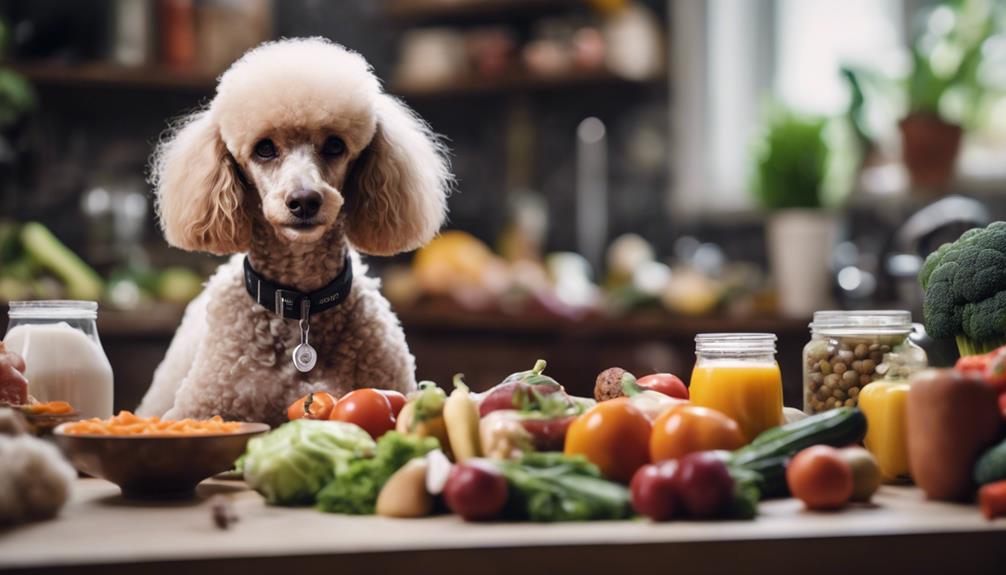When it comes to feeding your poodle, navigating through the maze of nutrition advice can be like untangling a knotted leash. Let's unravel the myths surrounding poodle nutrition together, shedding light on what truly fuels these graceful companions. From misconceptions about meat-only diets to the controversy surrounding store-bought kibble, there's a lot to uncover about what keeps your poodle in top shape.
Key Takeaways
- Feeding poodles only meat leads to nutritional deficiencies.
- Raw diets may lack essential nutrients for poodles.
- By-products are nutritious and beneficial for poodles.
- Meat as the primary ingredient is a myth; balanced nutrition is key.
Meat-Only Diet Misconception
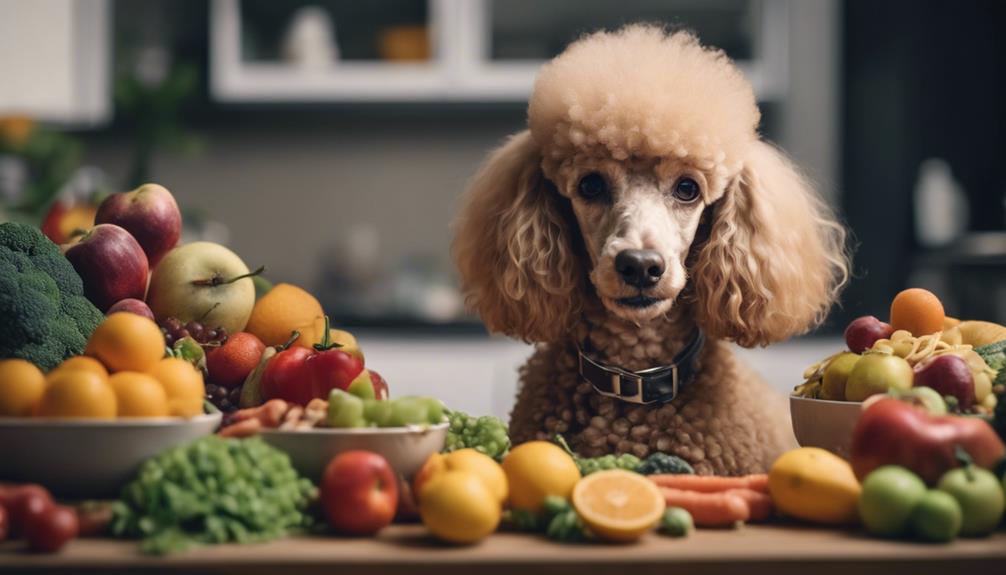
Feeding poodles a diet exclusively composed of meat is a common misconception that can lead to significant nutritional deficiencies. While meat is an essential component of their diet due to its high-quality protein content, poodles, like all dogs, have diverse nutritional needs that cannot be met through meat alone. Dog food formulated for poodles takes into account their specific requirements, including a balance of proteins, fats, carbohydrates, vitamins, and minerals.
To address the nutritional needs of poodles adequately, a balanced diet that incorporates starches, vegetables, and fruits alongside high-quality proteins is essential. This variety ensures that poodles receive a spectrum of nutrients crucial for their well-being. Specifically, deficiencies in calcium, Vitamin A, and Vitamin D can arise from a meat-only diet, highlighting the importance of a well-rounded approach to poodle nutrition. By providing a balanced diet tailored to their requirements, you can help prevent nutritional deficiencies and support your poodle's overall health and vitality.
Raw Diets Superiority Myth
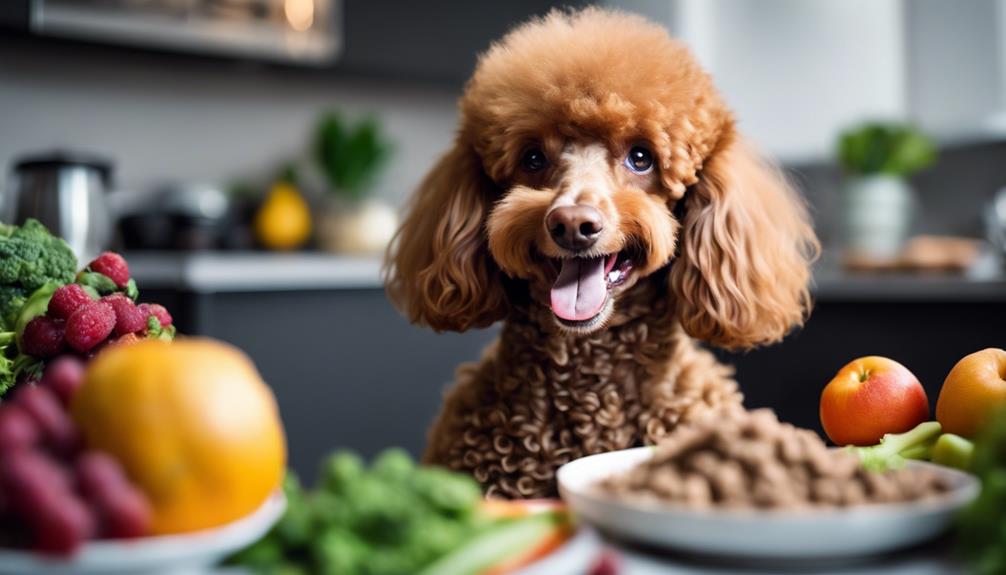
Raw diets for poodles are often touted as superior in terms of nutrition, but research indicates otherwise. While some believe raw diets offer a more natural and healthy option, scientific evidence suggests that this may not be the case for poodles. Opting for a well-balanced, commercially prepared pet food is a safer choice, as raw diets can lack essential nutrients crucial for poodles' health. Moreover, raw diets may expose poodles to bacterial contamination, posing risks to their well-being. Veterinarians caution against raw diets for poodles due to these potential health hazards. Below is a comparison table highlighting the key considerations between raw diets and commercial pet food for poodles:
| Consideration | Raw Diets for Poodles | Commercial Pet Food |
|---|---|---|
| Nutritional Balance | Lack essential nutrients | Well-balanced |
| Bacterial Contamination | Risk of contamination | Safe option |
| Veterinarian Approval | Not recommended | Recommended |
| Overall Safety | Potential health risks | Safer choice |
Negative Perception of By-Products
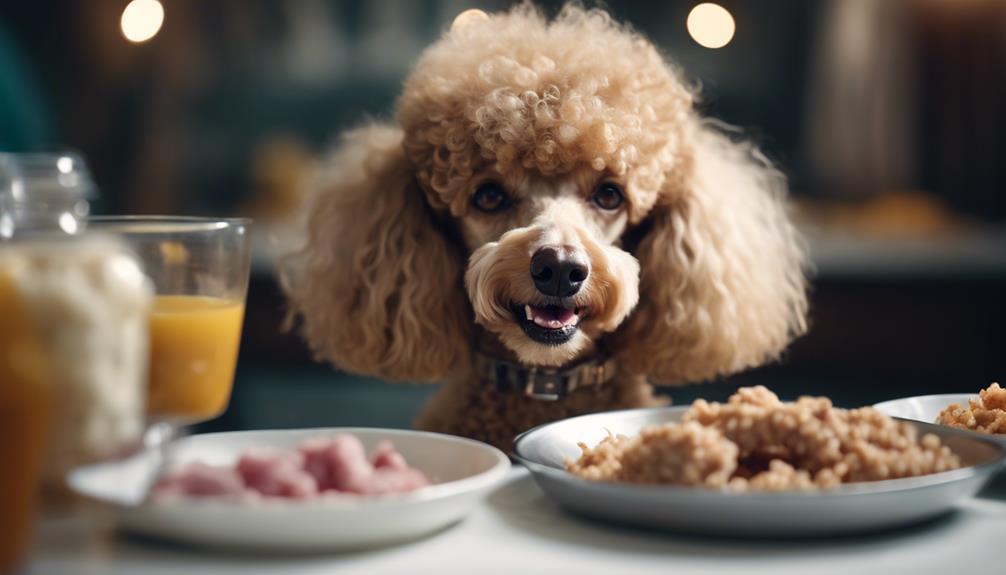
You may have heard negative connotations associated with by-products in pet food, but it's essential to understand that by-products can be nutritious and beneficial for your Poodle. Misconceptions about by-products being low-quality or fillers are often unfounded, as they can provide essential nutrients like vitamins, minerals, and proteins. Embracing the nutritional value of by-products can help ensure your pet receives a well-balanced diet that supports their health and well-being.
By-Products Are Nutritious
Highlighting the nutritional value of by-products is essential to dispel the negative perception surrounding their inclusion in Poodle diets. By-products in pet food are highly digestible and provide essential nutrients like protein, vitamins, and minerals for your Poodle. These by-products, when sourced from healthy animals, contribute to a balanced diet and are not low-quality fillers. Certain by-products are even considered human-grade, offering nutritional benefits that support your Poodle's health. Reputable pet food manufacturers use by-products responsibly to enhance the nutritional value of pet food formulations. By-products serve as an important additional source of nutrients that can help meet your Poodle's dietary requirements for optimal health.
| Nutrient | Description | Importance |
|---|---|---|
| Protein | Essential for growth, repair, and maintenance of tissues. | Supports muscle development and health. |
| Vitamins | Necessary for various metabolic functions and overall health. | Aids in immune function and vitality. |
| Minerals | Play crucial roles in bone health, fluid balance, and nerve function. | Important for overall well-being. |
Misconceptions About By-Products
By-products in pet food, often unfairly stigmatized, are in fact highly nutritious sources of essential nutrients crucial for your Poodle's health. These ingredients, such as organs, bones, and other parts not typically consumed by humans, offer valuable nutritional benefits. By-products contain protein, vitamins, and minerals that contribute to a well-rounded diet for your pet. They can address nutrient deficiencies that may arise from solely relying on muscle meat. Additionally, the responsible use of by-products in pet food production aids in reducing waste and promoting sustainability. Despite misconceptions, by-products play a vital role in ensuring that your Poodle receives a complete and balanced diet, supporting their overall health and well-being.
Safety of Store-Bought Kibble
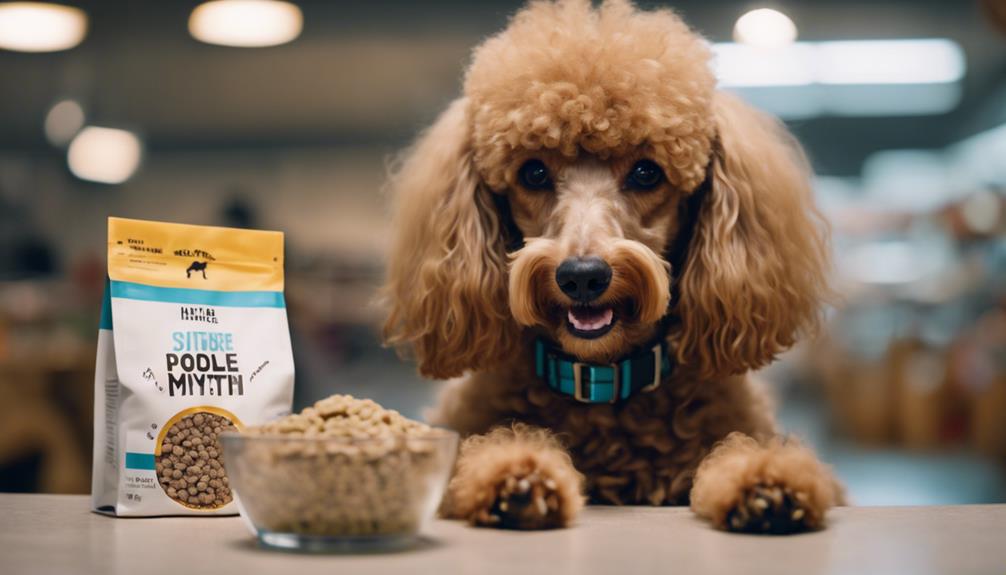
When it comes to the safety of store-bought kibble for Poodles, you can trust that these products have undergone extensive testing to ensure they meet nutritional standards. Brands like Royal Canin and Hill's Science Diet provide formulas specifically designed to address the dietary needs of Poodles. Opting for store-bought kibble can eliminate potential health risks associated with unbalanced homemade or raw diets.
Kibble Ingredient Transparency
Store-bought kibble for Poodles undergoes stringent regulation by the FDA to ensure adherence to specific safety and quality standards, providing pet owners with transparency regarding the ingredients included in the food. The ingredient lists on kibble packaging offer insight into what your Poodle is consuming, including essential nutrients like proteins, fats, carbohydrates, and vitamins. Manufacturers meticulously follow guidelines for ingredient sourcing and production processes, guaranteeing the quality of the final product. By understanding the ingredients in kibble, you can make informed decisions about your Poodle's nutrition, ensuring they receive a balanced diet tailored to their needs. This transparency empowers pet owners to select high-quality food that promotes the health and well-being of their beloved furry companions.
Health Concerns Addressed
To ensure the safety of your Poodle's diet, store-bought kibble undergoes rigorous testing to meet stringent nutritional standards. When considering your Poodle's health, a balanced diet plays a crucial role. Here are some key points to keep in mind regarding the safety of store-bought kibble for your beloved pet:
- Nutritional Standards: Kibble is formulated to provide essential nutrients like protein, fats, vitamins, and minerals for Poodles.
- Prevention of Health Issues: Balanced kibble diets help prevent health issues like obesity, dental problems, and nutrient deficiencies in Poodles.
- Tailored Formulations: Reputable kibble brands offer specific formulations for Poodles based on their size, age, and activity level.
Veterinarians and Pet Food Allegations
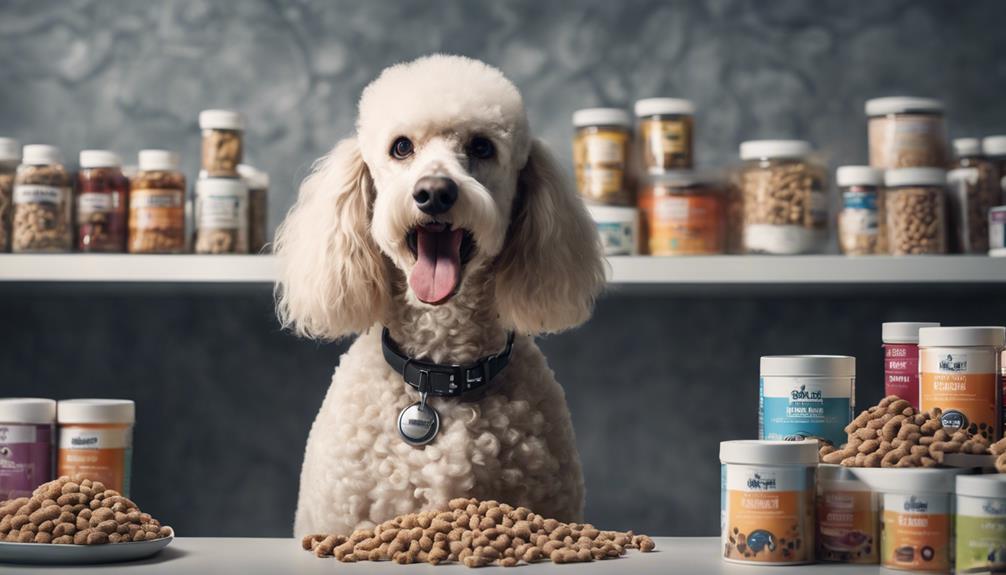
Veterinarians, as trusted professionals in the field of pet health, prioritize evidence-based nutrition recommendations over personal gain when addressing pet food allegations. They base their pet food recommendations on nutritional needs and scientific evidence, ensuring that your poodle receives the best diet possible. Financial gains from selling pet food are minimal for veterinarians, highlighting their commitment to prioritizing pet health over profit. When veterinarians endorse specific pet food brands, they do so because these brands offer formulas tailored to address various diseases and conditions, backed by research and quality standards. By recommending these diets, veterinarians ensure that your poodle's nutrition is optimized for their well-being. Therefore, rest assured that when it comes to pet food allegations, veterinarians have your pet's best interests at heart, focusing on the safety and efficacy of the products they recommend. Trust in your veterinarian's expertise for the optimal nutrition of your beloved poodle.
Vegetarian Diet Feasibility for Poodles
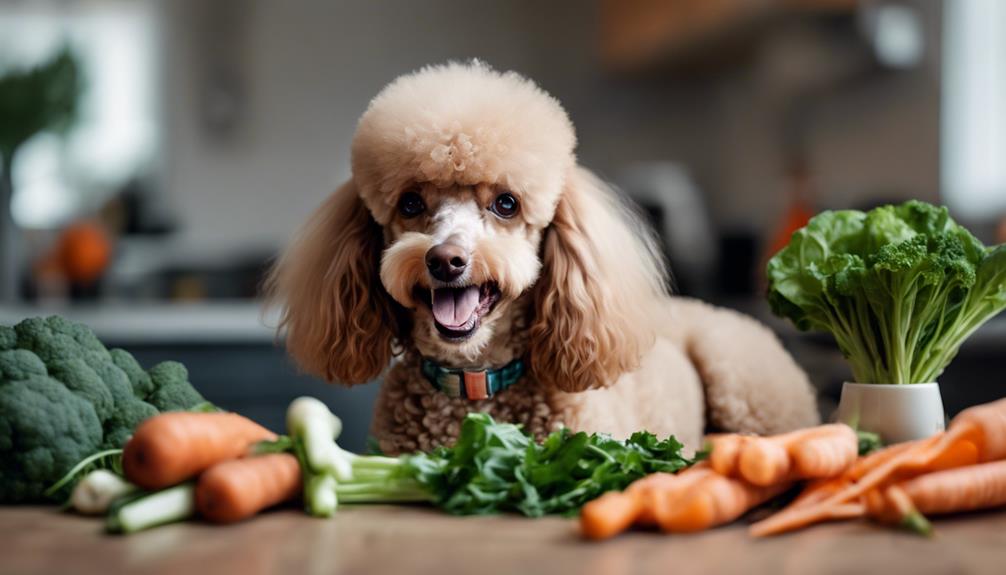
Feeding poodles a vegetarian diet can lead to nutrient deficiencies and may not meet their specific dietary requirements for optimal health and well-being. Poodles, being carnivores by nature, require essential nutrients found in meat to thrive. Here are three crucial points to consider regarding the feasibility of a vegetarian diet for poodles:
- Nutrient Deficiencies: A vegetarian diet for poodles may result in deficiencies in vital amino acids and vitamins necessary for their overall health. These deficiencies can impact their energy levels, immune function, and overall well-being.
- Specific Dietary Needs: Poodles have specific dietary needs that are best met through a balanced diet that includes high-quality animal proteins. These proteins provide essential nutrients that are challenging to obtain solely from plant-based sources.
- Consultation with a Veterinarian: Before considering a vegetarian diet for poodles, consulting with a veterinarian is crucial. A professional can help ensure that the poodle's unique nutritional requirements are appropriately addressed and met, safeguarding their health and vitality.
Meal Variety Importance
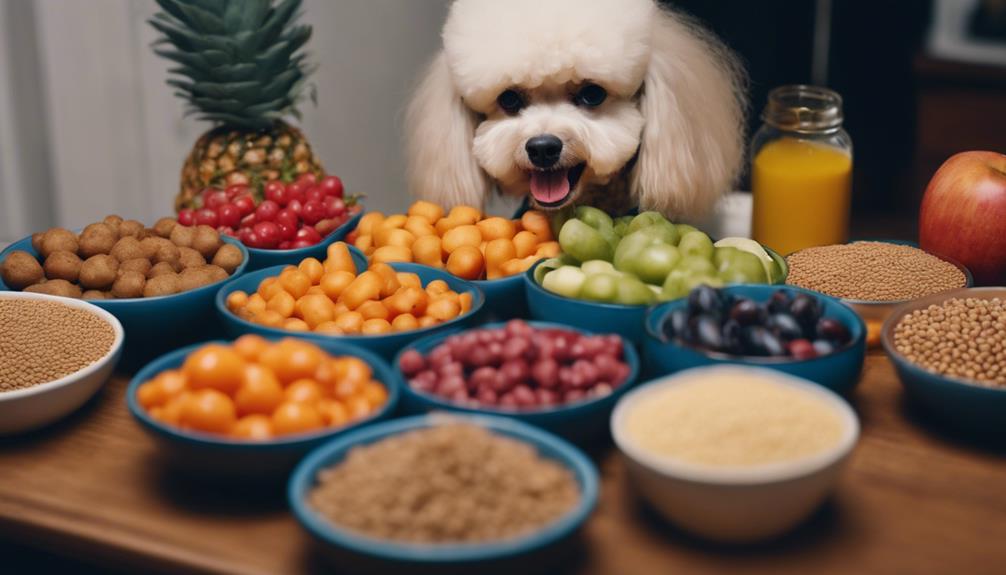
Considering the specific dietary needs of Poodles, meal variety plays a crucial role in ensuring their optimal health and well-being. Providing a nutritionally balanced diet through a variety of meals can help prevent nutrient deficiencies, support optimal digestion, and promote overall health in Poodles. Rotating proteins and sources is particularly beneficial as it can aid in reducing food sensitivities that some Poodles may experience. By offering a mix of textures and flavors, mealtime boredom and picky eating habits can be minimized, encouraging a more diverse and complete diet for your furry companion. Additionally, understanding how often to feed your Poodle is an essential aspect of maintaining their dietary health. Adult Poodles typically thrive on two well-portioned meals per day, while puppies may require more frequent feedings to support their growth and energy needs. Striking the right balance between portion size and feeding frequency ensures that your Poodle receives consistent energy throughout the day without overeating.
| Benefits of Meal Variety for Poodles | |
|---|---|
| Preventing Nutrient Deficiencies | Different foods offer a range of essential nutrients for overall health in Poodles. |
| Reducing Food Sensitivities | Rotating proteins and sources can help reduce food sensitivities in Poodles. |
| Supporting Balanced Diet | Meal variety supports a balanced diet for optimal health in Poodles. |
| Preventing Mealtime Boredom | Offering a mix of textures and flavors can prevent picky eating habits in Poodles. |
Health Implications of Grain-Free Diets

The health implications of grain-free diets in dogs have raised concerns due to potential links to dilated cardiomyopathy (DCM) and nutritional deficiencies. Here is a deeper look at the key points:
- Increased DCM Risk: Grain-free diets have been associated with a higher risk of dilated cardiomyopathy in dogs. Research indicates that a deficiency in taurine, an amino acid essential for heart health, which is common in grain-free diets, may contribute to the development of DCM.
- Nutritional Deficiencies: Grain-free diets may lack essential nutrients such as fiber, which can lead to digestive issues in dogs. These deficiencies could have long-term implications for your Poodle's overall health and well-being.
- FDA Investigation: The FDA is currently investigating the potential connection between grain-free diets and heart disease in dogs. While more research is needed to fully understand this relationship, veterinarians recommend caution and advise pet owners to consult with professionals for personalized nutrition advice tailored to their Poodle's specific needs.
Cooking Vs. Raw Food Debate
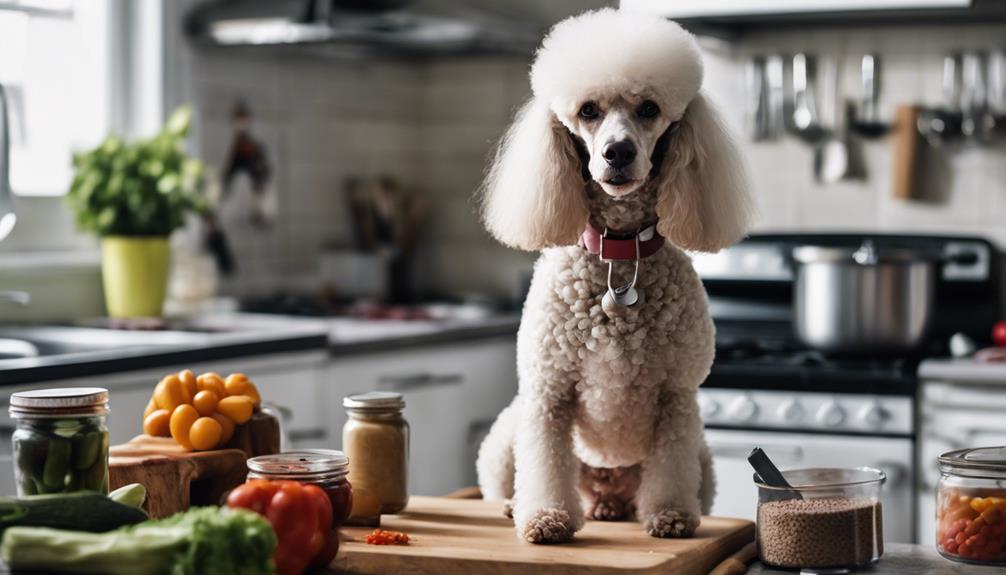
Research suggests that the debate between cooking and raw food diets for dogs hinges on key considerations regarding health and nutrition. When deciding between cooking and raw food for your poodle, it is essential to prioritize their nutritional balance. While raw diets are popular among some pet owners, they can pose risks due to bacterial contamination and potential nutritional deficiencies. Opting to cook your poodle's food can help eliminate harmful bacteria present in raw meat, making it a safer option. Moreover, cooked or processed foods are often recommended by veterinarians as they provide a more reliable way to ensure your pet receives essential nutrients.
| Cooking | Raw Food |
|---|---|
| Eliminates harmful bacteria | Risk of bacterial contamination |
| Ensures nutritional balance | Potential nutritional deficiencies |
| Recommended by veterinarians | Lack of scientific evidence for benefits |
Choosing a balanced diet through cooking or processing food is crucial for your poodle's overall health and well-being. This ensures your poodle gets the right mix of nutrients to support their energy levels, coat health, and immune system. Incorporating homemade poodle diet recipes allows you to tailor meals to meet your dog’s specific dietary needs, avoiding harmful fillers or allergens commonly found in some commercial pet foods. By preparing these meals at home, you can also monitor portion sizes and ingredient quality more closely.
Bones in Poodle Nutrition
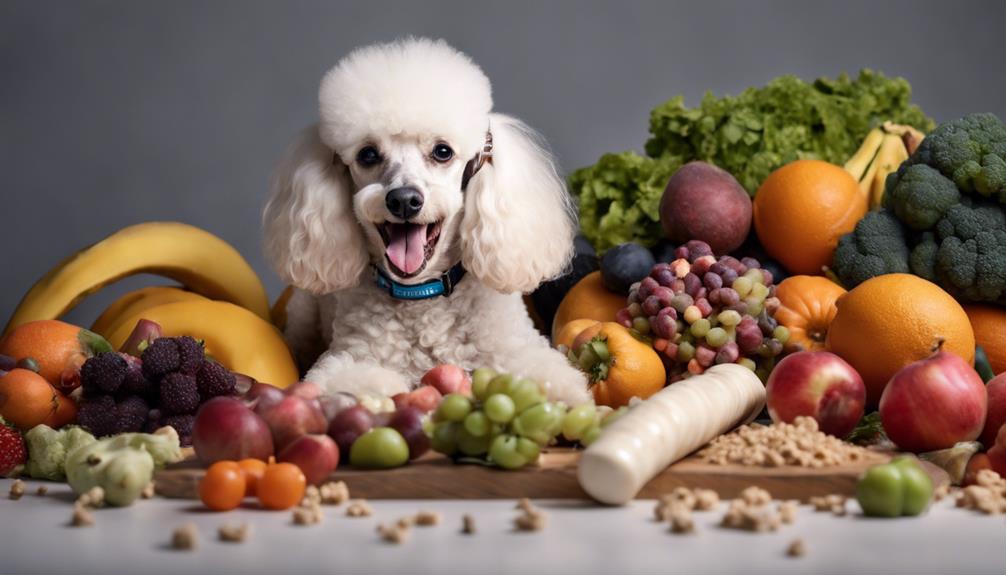
Avoid giving bones to your poodle as they can splinter, posing choking hazards and internal injuries. Opt for safer alternatives like chew toys or treats to prevent bone-related health risks. Protect your poodle's well-being by refraining from providing bones in their diet.
Bone Health Importance
Promoting optimal bone health in Poodles necessitates a diet rich in essential minerals like calcium and phosphorus. Adequate bone health is vital for overall well-being and mobility in Poodles. Here are three key points to consider for bone health importance:
- Calcium and Phosphorus: These minerals are crucial for maintaining strong bones and supporting various bodily functions.
- Prevention of Issues: Proper bone density helps prevent fractures and joint problems, enhancing your Poodle's quality of life.
- Growth and Development: Including bone-supporting nutrients in your Poodle's diet promotes healthy growth and development, ensuring they thrive.
Ensuring your Poodle's diet includes the right balance of nutrients is essential for maintaining optimal bone health and overall wellness.
Dietary Bone Sources
Incorporating bones into your Poodle's diet can provide a natural source of essential minerals, such as calcium, for optimal bone health and dental benefits. Bones offer a way to supplement your Poodle's diet with important nutrients that contribute to their overall well-being. When selecting bones, opt for raw, non-weight-bearing options to reduce the risk of splintering. Properly sized bones, given under supervision, can aid in maintaining good dental health by helping to clean teeth and strengthen gums. However, it's crucial to monitor bone consumption to prevent digestive complications or obstructions. To ensure the safety and nutritional balance of your Poodle's diet, consulting a veterinarian before introducing bones is highly recommended.
Bone-Related Health Risks
When considering the nutritional aspects of poodle diets, it is crucial to be aware of the potential bone-related health risks associated with incorporating bones into their nutrition. Feeding bones to poodles can lead to splintering, causing choking hazards and internal injuries. Poodles should avoid chewing on bones to prevent serious health risks and potential emergency vet visits. Providing poodles with safe chew toys or treats is a preferable alternative to bones for dental health. Bones in poodle nutrition pose a significant threat to digestive health and overall well-being. Bone-related health risks highlight the importance of choosing safe and appropriate treats for poodles. Remember, prioritizing your poodle's health by avoiding bones can prevent unnecessary health complications and ensure a happy, active companion.
Protein Quantity Fallacy
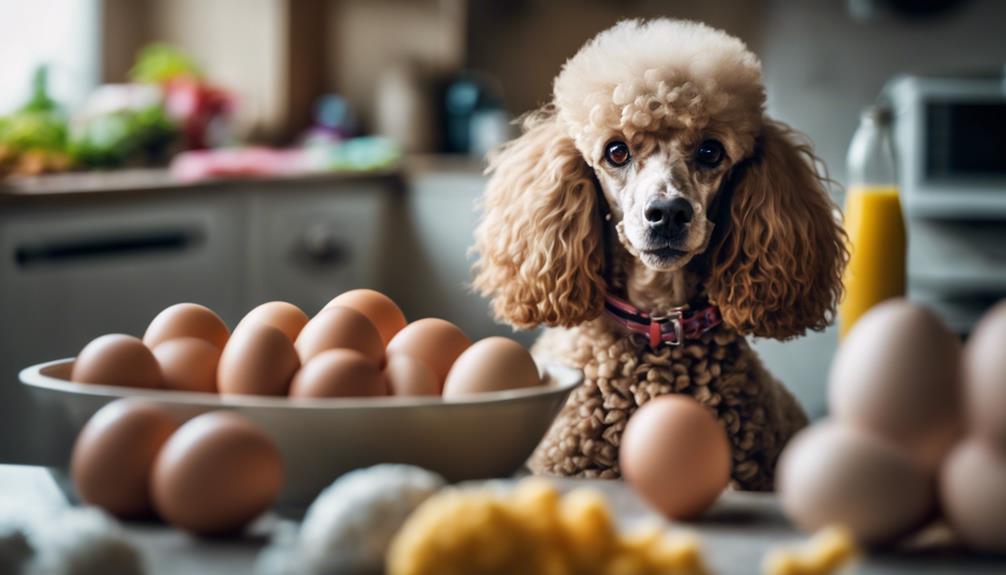
To ensure optimal health and muscle maintenance in poodles, it is crucial to provide a balanced diet with moderate protein levels, avoiding the misconception of needing excessively high protein quantities. Poodles do not require extremely high protein levels as this can strain their kidneys, leading to potential health issues. A diet with moderate protein quantities is sufficient for their well-being. It is essential to tailor the protein quantity to your poodle's size, age, and activity level to prevent any adverse effects. Contrary to popular belief, excess protein in poodle diets does not necessarily enhance muscle development but can instead result in weight gain. Consulting with a veterinarian is advisable to determine the ideal protein quantity for your poodle, ensuring that their nutritional needs are met without causing any health complications. Remember, moderation is key when it comes to protein levels in your poodle's diet for a healthy and thriving companion.
Human Food Compatibility for Poodles
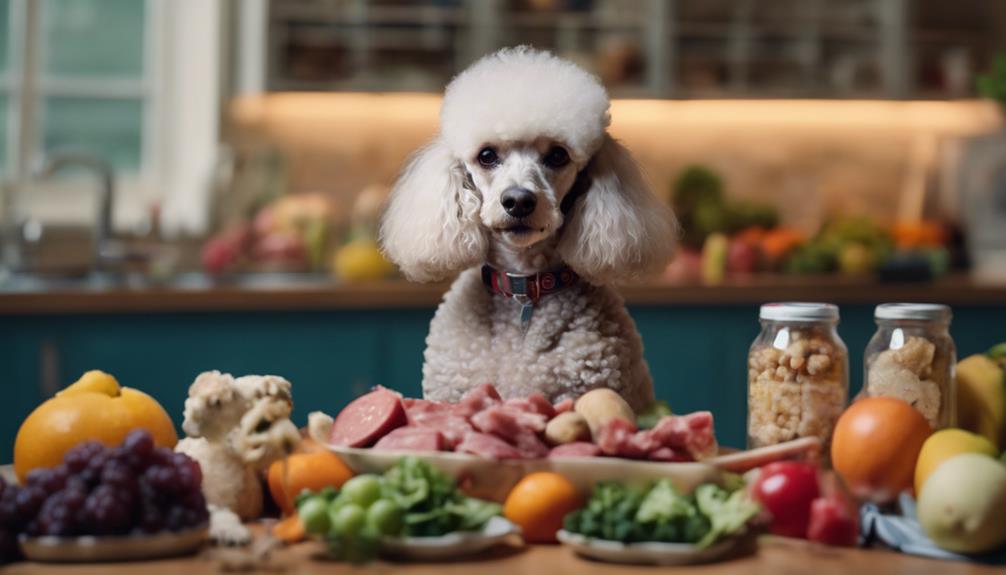
Cooked chicken, rice, and carrots are safe and beneficial human food choices for poodles, providing essential nutrients and contributing to a balanced diet. When considering human foods for your poodle's diet, it's important to choose wisely to ensure their health and well-being. Here are some key points to keep in mind:
- Cooked Chicken: This option is rich in protein, which is crucial for muscle development and overall health in poodles. It also offers essential nutrients that support their immune system and vitality.
- Rice: Adding rice to your poodle's diet can provide easily digestible carbohydrates, which are a good energy source. It can also help with digestion and provide necessary fiber for gastrointestinal health.
- Carrots: These vegetables are a great choice due to their vitamin content, particularly vitamin A, which is beneficial for your poodle's vision and immune system. Carrots also offer fiber, promoting digestive health.
Remember to avoid foods like chocolate and onions, as they can be harmful to your poodle and lead to serious health issues. By incorporating safe and nutritious human foods into your poodle's diet, you can help them thrive and stay healthy.
Grass Eating Normalcy in Poodles

Grass eating is a common and natural behavior observed in poodles, often serving various digestive and dietary purposes. Dogs, including poodles, may consume grass to aid in digestion, alleviate stomach discomfort, or fulfill their need for fiber. This behavior is not necessarily a cause for concern, as it is generally harmless and can be traced back to their ancestral instincts as hunters and scavengers. Monitoring the frequency and quantity of grass consumption in poodles can help determine if it is part of their regular habits or potentially indicative of an underlying issue. While some owners may worry about their poodles eating grass, it is vital to understand that this behavior is a normal part of their overall dietary behavior. By recognizing the natural inclinations of poodles to consume grass, owners can better appreciate their pets' instincts and preferences when it comes to nutrition and digestive health.
Primary Ingredient Misconception
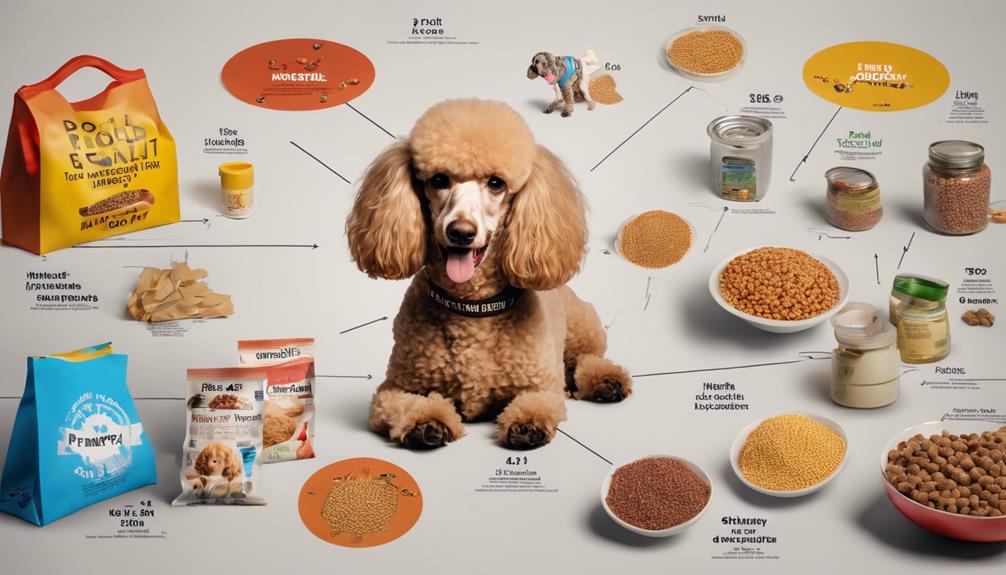
Challenging the common belief that meat must be the primary ingredient in poodle food, it is essential to understand that a balanced diet encompassing proteins, fats, and carbohydrates is key to their overall well-being. Poodles need a well-rounded nutritional approach rather than focusing solely on one ingredient. Here are key points to consider: To ensure optimal health, incorporating high-quality sources of protein along with healthy fats and fiber-rich carbohydrates can support their energy levels and digestive health. Additionally, following poodle diet best practices means considering their individual needs based on age, size, and activity level, rather than adopting a one-size-fits-all approach. Consulting a veterinarian can also help tailor their diet to meet specific nutritional requirements.
- Myths Debunked: The myth that meat should be the primary ingredient in poodle food is not based on nutritional science.
- Nutritional Needs: Poodles require a mix of proteins, fats, and carbohydrates to support their energy levels and overall health.
- Balanced Diet Importance: Quality ingredients and nutritional balance are crucial for poodles, rather than fixating on a single primary ingredient.
Organic and Natural Pet Food Truths
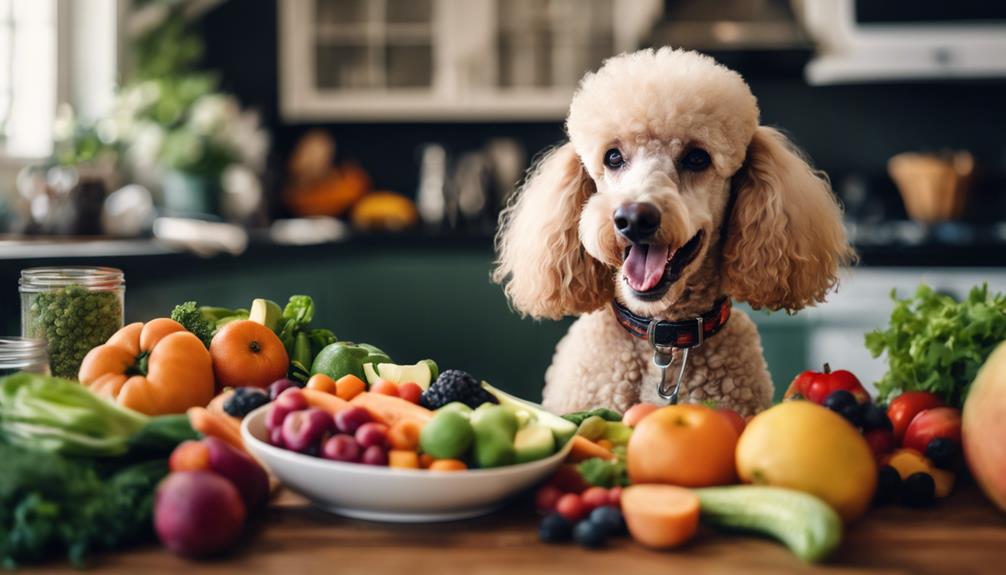
When considering the nutritional choices for your poodle, it is important to recognize that terms like natural and organic on pet food labels may not always signify superior quality or enhanced nutritional benefits. While organic pet foods may seem like a healthier option, they do not always offer superior nutrition compared to non-organic alternatives. The USDA certification for organic ingredients does not guarantee enhanced nutritional value in pet food. Terms such as natural, organic, and holistic on pet food labels do not consistently indicate healthier choices either. The nutrient content and benefits of organic ingredients in pet food can vary widely, and not all natural or organic pet foods provide the essential nutrients needed for optimal pet health. Therefore, it is crucial to carefully examine the ingredient list and nutritional information on pet food packaging to ensure that your poodle is receiving a well-balanced diet that meets its specific dietary requirements.
Frequently Asked Questions
What Meat Should Dogs Not Eat?
You shouldn't feed dogs toxic meats, harmful proteins, or dangerous ingredients. These can lead to health issues and harm your pet. Stick to safe meats like lean chicken or beef to keep your dog healthy.
What Does Dog Eat?
You need a balanced diet with proteins, fats, carbs, and essential nutrients for optimal health. Your meals should include meats, veggies, grains, and fruits. Don't just eat meat; it might leave you lacking vital nutrients.
What Food Is Good for Dogs?
To meet your dog's nutritional needs, ensure a balanced diet rich in proper nutrients like proteins, fats, and carbohydrates. Include calcium, vitamins, and minerals from various sources like starches, vegetables, and fruits for overall health.
What Foods Can Puppies Not Have?
You should avoid giving puppies toxic treats like chocolate, onions, garlic, grapes, and raisins. Harmful ingredients such as xylitol in sugar-free gum and certain peanut butter could be dangerous. Watch out for dangerous snacks to keep your puppy safe.
Conclusion
In conclusion, debunking myths about poodle nutrition is crucial for ensuring the health and well-being of these beloved pets. One example of this is a case study where a poodle with a history of skin allergies and digestive issues saw significant improvement after transitioning to a balanced diet that included proteins, fats, vegetables, and grains. By following evidence-based nutrition guidelines, poodle owners can provide the best care for their furry companions. Educating pet owners about these misconceptions not only promotes better health outcomes for poodles but also strengthens the bond between owners and their pets. In addition to a balanced diet, considering supplements for poodle nutrition can address specific health needs, such as joint support or coat health, ensuring a more personalized approach to their care. Ultimately, prioritizing proper nutrition empowers poodle owners to help their pets lead long, happy, and active lives. Educating pet owners about poodle diet and nutrition tips can empower them to make informed decisions that cater to their dog’s specific needs. This includes consulting with veterinarians to identify potential food sensitivities and incorporating high-quality ingredients tailored to support overall health. Ultimately, understanding the connection between proper nutrition and a poodle’s vitality can lead to a happier, longer life for these cherished pets.
